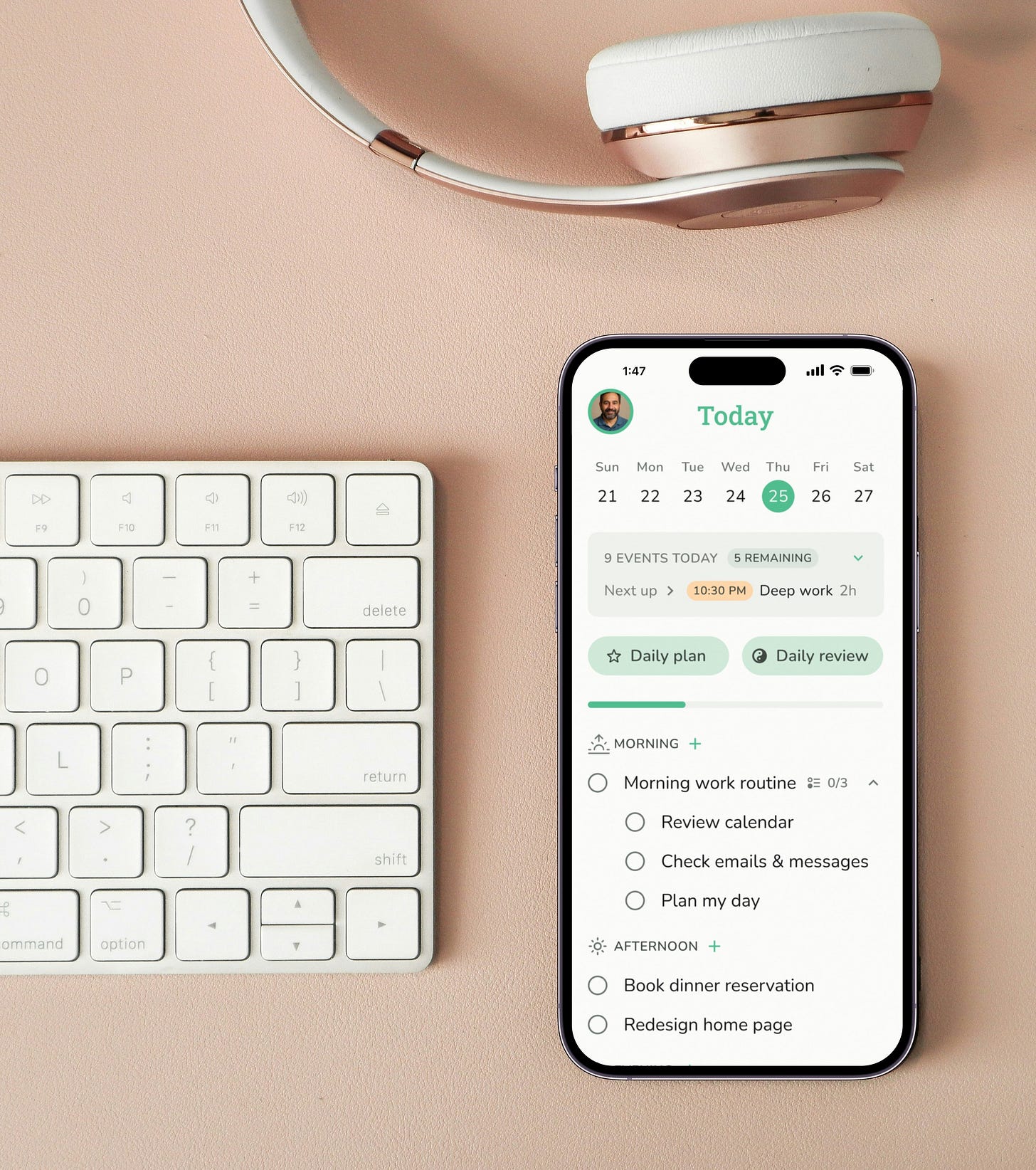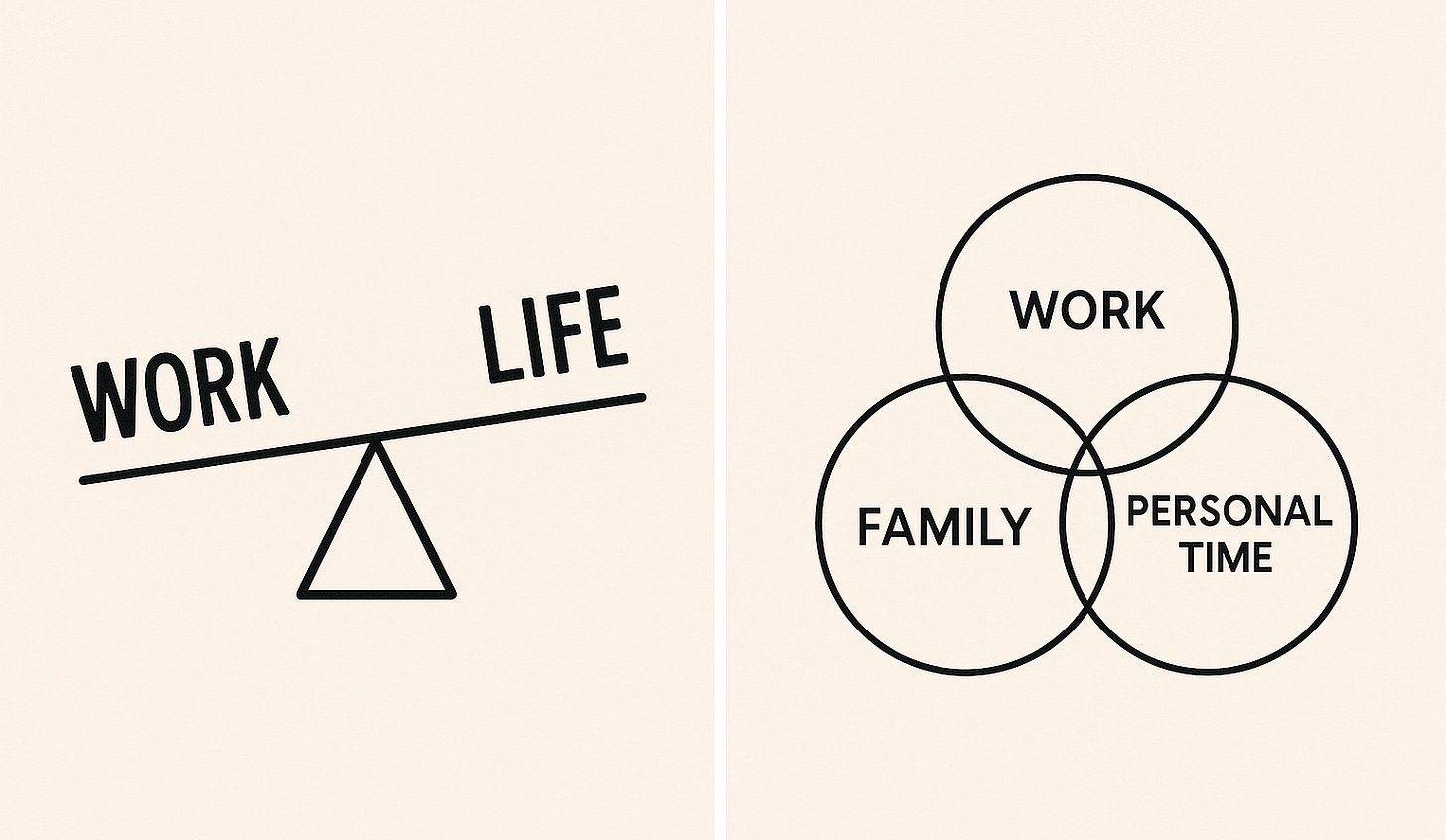How to Juggle Work, Family, and Personal Time Without Dropping the Ball
A Parent's Guide to Work-Life Integration
It's 6:30 PM. You're still answering work emails while your dinner gets cold, your kids are asking for help with homework, and that workout you promised yourself? It's not happening—again. If this sounds painfully familiar, you're not alone in the daily juggling act that modern life demands.
The struggle to balance our professional responsibilities, family commitments, and personal needs has never been more challenging. With remote work blurring boundaries, digital distractions multiplying, and the pressure to be ever-present in all areas of life, many of us feel like we're constantly dropping balls despite our best efforts.
But what if the secret isn't about becoming a master juggler—but rather, changing the game entirely? In this post, I'll share practical strategies that have helped thousands of busy people reclaim their time, prioritise what truly matters, and create a life that feels less like a circus act and more like a well-conducted symphony.
Understanding the Balancing Act
The first step to managing your time effectively is to challenge the very notion of "work-life balance." This concept, which implies equal weight given to different areas of life at all times, sets an unrealistic standard that leaves many feeling like failures.
Instead, consider embracing "work-life integration"—a more fluid approach that acknowledges different areas of your life will require different levels of attention at different times. Some weeks, work will demand more of you. Other times, family needs will take priority. And occasionally, your personal wellbeing must come first.
The key is intentionality. When you're conscious about where your time and energy are flowing, you can make deliberate choices rather than feeling like life is happening to you.
"Balance is not about spending equal time in each area of your life, but about being fully present wherever you choose to be." — Jon Butcher
Setting Priorities That Matter
The foundation of effective time management is clarity about what truly matters to you. Try this exercise:
Take a blank sheet of paper and draw three columns labeled "Work," "Family," and "Personal."
Under each column, list your absolute "non-negotiables"—the commitments that align with your deepest values and that you're unwilling to compromise on.
Be ruthlessly honest and keep the list short (3-5 items per column).
For example:
Work:
Delivering high-quality projects on time
Contributing meaningful ideas in team meetings
Learning one new skill quarterly
Family:
Weeknight dinners together
Saturday morning activities with the kids
Weekly date night with spouse
Personal:
30 minutes of exercise 5x per week
15 minutes of meditation daily
One social connection with friends weekly
Once you've identified these priorities, the next step is creating boundaries to protect them. This might mean:
Blocking off family dinner time in your work calendar
Setting an alarm to end your workday
Creating a morning ritual that ensures personal time happens first
Smart Time Management Strategies

With priorities established, tactical time management becomes much more effective. Here are three powerful techniques:
Time-Blocking
Rather than working from a to-do list, schedule specific blocks of time for different activities. Research shows this approach can increase productivity by up to 150%.
Designate 90-120 minute blocks for deep work
Schedule "shallow work" (emails, calls) in shorter blocks
Include transition time between blocks
Don't forget to schedule blocks for family and personal time
Task Batching
Group similar tasks together to minimise the mental energy lost when switching contexts:
Designate specific times for email/messaging
Batch household chores
Group similar work tasks (calls, creative work, administrative tasks)
Strategic "No"
Perhaps the most powerful time management tool is the ability to decline requests that don't align with your priorities. Practice these phrases:
"That sounds interesting, but I can't commit to it right now."
"I'd love to help, but my plate is full this month."
"I need to focus on X right now, but I could consider this in the future."
The Family Component
When it comes to family time, quality trumps quantity every time.
Research consistently shows that children benefit more from fully engaged interaction than from mere physical presence.
Create meaningful rituals that your family can count on:
Special weekend breakfasts
Evening walks after dinner
Sunday game nights
Monthly one-on-one dates with each child
Most importantly, involve your family in the planning process. Even young children can understand: "Dad has an important deadline this week, so we'll have shorter story times, but this weekend we'll have a special adventure together."
This approach teaches children valuable lessons about priorities, commitments, and the importance of balance—lessons they'll carry into adulthood.
The Work Component
In today's always-connected workplace, managing your professional responsibilities requires intentional boundaries:
Set Clear Expectations
Communicate your availability clearly to colleagues
Establish response time expectations for emails and messages
Be transparent about your family commitments when necessary
Maximise Productivity During Work Hours
Identify your peak cognitive times and schedule your most demanding work then
Use techniques like the Pomodoro method (25 minutes of focused work, 5-minute break)
Eliminate distractions during deep work sessions
Disconnect Deliberately
Set an "end of workday" ritual (e.g., reviewing tomorrow's priorities, clearing your desk)
Use technology to enforce boundaries (e.g. email auto-responders, app time limits)
Create physical separation between work and home areas if possible
The Personal Component
Self-care isn't selfish—it's essential. Think of it as putting on your own oxygen mask first; you can't effectively care for others if you're depleted.
The good news is that personal time doesn't require hours of availability. Consider these micro-moments of self-care:
10-minute meditation sessions
Quick journaling while drinking your morning coffee
A podcast during your commute
A brief walk around the block between meetings
Building a support network is equally important. This might include:
Trading childcare with another family
Hiring help for household tasks when possible
Joining communities (online or in-person) of people with similar challenges
Regular check-ins with a friend or mentor who understands your situation
When Things Fall Apart (And They Will)
Even with the best planning, life happens. Deadlines get moved up, children get sick, and unexpected challenges arise. The difference between those who manage the juggling act successfully and those who don't often comes down to adaptability.
Develop these resilience practices:
Build buffer time into your schedule for unexpected events
Have contingency plans for common disruptions
Practice the "rule of three"—identify the three most critical tasks that must happen today, no matter what
Learn to pivot quickly when needed, without beating yourself up
Perhaps most importantly, practice self-compassion. The goal isn't perfection but rather conscious choices that align with your values over time.
Conclusion
Juggling work, family, and personal time isn't about achieving perfect balance every day. It's about making intentional choices that reflect your priorities over time, creating systems that support those priorities, and developing the flexibility to adapt when life inevitably throws you curveballs.
Start small:
Identify one non-negotiable in each area of your life
Create boundaries to protect those priorities
Experiment with time-blocking for one week
Practice saying "no" to one low-priority request
Remember that finding your rhythm is a journey, not a destination. The strategies that work for you may evolve as your career develops, your children grow, and your personal needs change. What remains constant is the need for intentionality—being the author of your time rather than its victim.
What's one small change you'll implement today to better juggle your work, family, and personal time? Share in the comments below!









